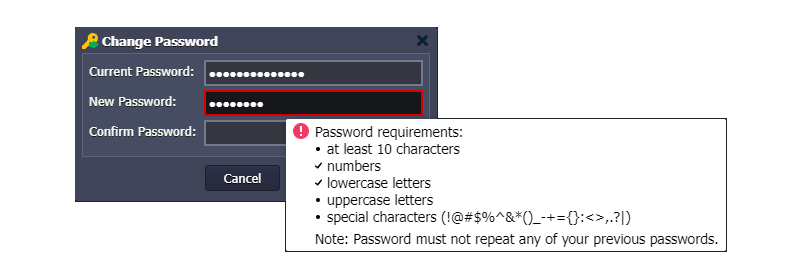CloudJiffy 6.3 – Release Notes
In this document, you will find all of the new features, enhancements and visible changes included to the Cloudjiffy PaaS 6.3 release.
New Features:
1. Password Policy
User accounts security is one of the top priorities for the Cloudjiffy PaaS. In the current 6.3 platform upgrade, a stricter password policy was implemented to ensure our customers’ safety. The new default requirements are:
- the minimum length of 10 characters
- at least one symbol for each of the following categories: numbers, lowercase and uppercase letters, special characters
- must not repeat any of the previous passwords

Also, account passwords remain valid for 180 days and must be reset after the expiration.
As an additional security measure, five consecutive unsuccessful attempts to log in will cause a temporary (15 minutes) lock for the corresponding IP address. The locked user can try again after the defined period or can reset the password.
Note: All the above-described values and criteria are part of Cloudjiffy’s new default policy, which can be modified for each particular platform by the respective service hosting providers.
2. Non-Zero Error Codes for CLI
Cloudjiffy CLI is a platform’s management and automation tool that allows handling the vast majority of the platform operations remotely. Usually, the CLI commands return zero code, while the response provides the actual results of the API method call. Starting with the 6.3 release, a new cloudjiffy.non_zero_exit_code parameter can be added to the CLI configuration file (located at ~/.config/cloudjiffy/cloudjiffy.properties by default). It defines if the CLI command should respond with zero code as usual (false – default value) or with a non-zero code when the executed API method returns an error (true).
Changed Features:
1. Inbound Ports Variable
CLOUJIFFY_PORTS is a special variable that is used during cloudjiffy containers creation to define which custom ports should be opened in the container’s firewall. In order to make the purpose of the variable intuitive, it was renamed to OPEN_INBOUND_PORTS in the current 6.3 platform release. Both values are supported to ensure backward compatibility, but all the new containers will be created with the OPEN_INBOUND_PORTS variant by default.
2. API Changes
Starting with the current platform release, Cloudjiffy PaaS provides a source file with all the supported public API in the OpenAPI Specification standard. You can download it in the YAML or JSON format by clicking on the appropriate link below:
- YAML
- JSON
You can integrate these files with any tool that supports OpenAPI standards (for example, Swagger tools) to generate clients based on the required programming language, build documentation, etc.
3. Software Stack Versions
The software stack provisioning process is independent of the platform release, which allows new software solutions to be delivered as soon as they are ready. However, due to the necessity to adapt and test new stack versions, there is a small delay between software release by its respective upstream maintainer and integration into Cloudjiffy PaaS.
The most accurate and up-to-date list of the certified software stack versions can be found on the dedicated documentation page.
Fixes Compatible with Prior Versions
Below, you can find the fixes that were implemented in the Cloudjiffy 6.3 release and also integrated into previous Cloudjiffy versions by means of the appropriate patches.
Bug Fixes
In the table below, you can see the list of bug fixes applied to the platform infrastructure and cluster admin panel starting from CloudJiffy 6.3 release:
| # | Affected Versions | Descriptions |
| JE-46964 | – | Incorrect error handling for issues with the “jem docker getenv” and “jem docker getruncmd” commands |
| JE-48918 | – | Incorrect firewall rules handling on the Memcached node when scaling compute nodes |
| JE-52338 | – | An environment domain cannot temporarily be resolved after attaching an external IPv6 address |
| JE-52387 | – | An error occurs when retrieving an environment variable with value in the JSON format |
| JE-57036 | – | The “NoFreeExtIP” cluster check in the JCA panel returns status 0 even when no free IPs are available on the platform |
| JE-57256 | 5.9.6 | JPS installations with the addNodes action are visually stuck in the dashboard despite being completed successfully |
| JE-59190 | – | Unnecessary systemd units in the Ubuntu VPS |
| JE-59264 | – | A custom “Sequential deployment with delay” value is reset to default for the subsequent deployments |
| JE-59432 | – | Incorrect localization in some emails when installing complex packages with multiple email notifications |
| JE-59516 | – | Network routes are missing after redeploying containers with multiple public IP addresses |
| JE-59537 | – | The environment delete action is stuck if any previous action is not finished yet |
| JE-59581 | 5.9.1 | Incorrect public IP count validation when adding new IP addresses |
| JE-59655 | – | The strict-transport-security header should be removed from the 50x error pages |
| JE-60200 | – | An error occurs when sending a GET request with the “Content-Type=application/json” header and API access token |
| JE-60294 | 6.0.6 | The OSTEMPLATE variable should be updated if the base OS was changed during the container redeploy |
| JE-60524 | – | An error occurs when redeploying a Debian 11 node that operates as an NFS server (exports data) |
| JE-60770 | – | An error occurs when refilling the account balance if the sum is too big |
